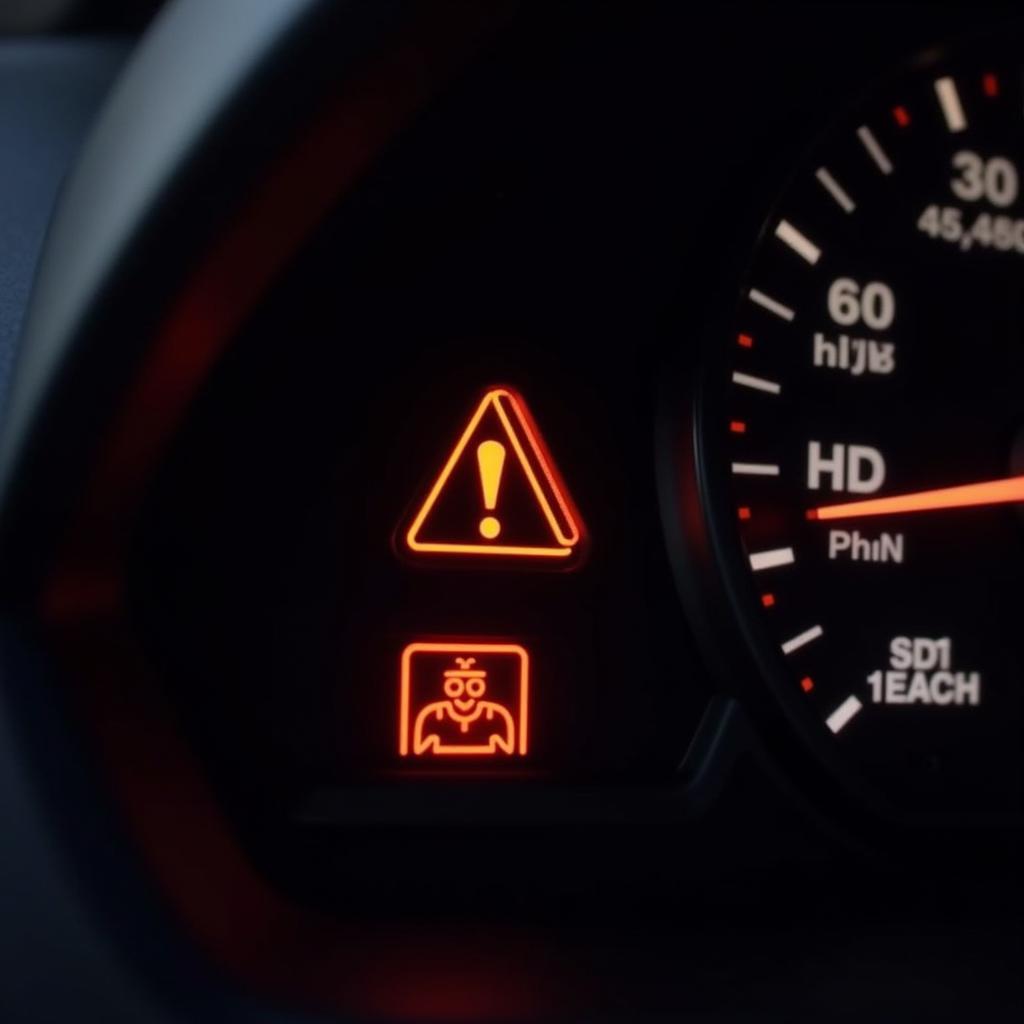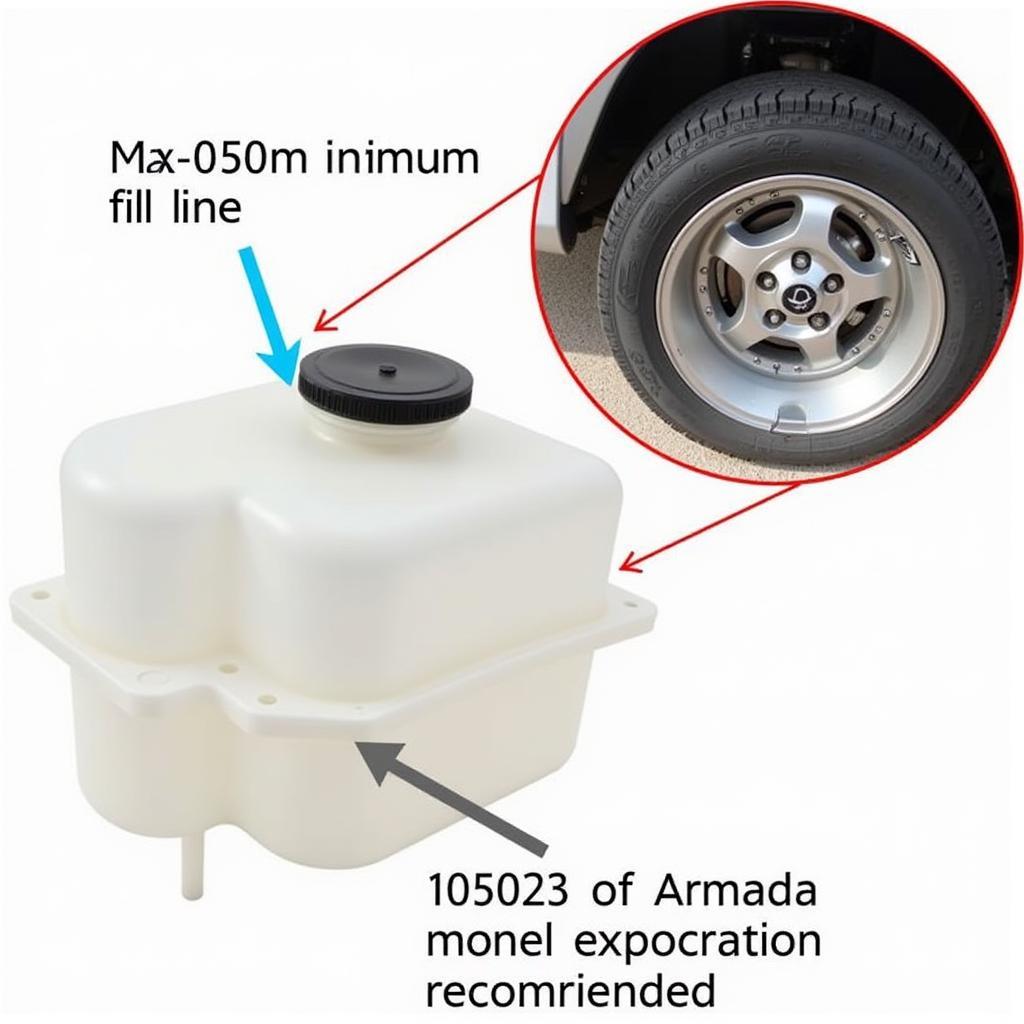The brake warning light on your 2008 Prius is a crucial safety feature designed to alert you of potential issues within your braking system. Ignoring this warning light could lead to brake failure and dangerous driving conditions. This comprehensive guide will walk you through the common causes of a 2008 Prius brake warning light and provide potential solutions to get you back on the road safely.
Understanding Your Prius’ Brake System
Before diving into the causes, it’s helpful to understand the basics of your Prius’ braking system. The 2008 model features a regenerative braking system that works in conjunction with traditional hydraulic brakes.
- Regenerative Braking: This system uses the electric motor to slow down the vehicle, converting kinetic energy into electrical energy to recharge the hybrid battery.
- Hydraulic Braking: This system uses brake fluid pressure to activate calipers, which press brake pads against rotors to slow or stop the wheels.
The brake warning light monitors various components within both systems, illuminating when it detects an issue.
Common Causes of a 2008 Prius Brake Warning Light
Several factors can trigger the brake warning light in your 2008 Prius. Here are some of the most common culprits:
1. Low Brake Fluid Level
The most common reason for the brake warning light is low brake fluid. Brake fluid is essential for transmitting the force from your foot on the brake pedal to the wheels.
How to Check:
- Locate the brake fluid reservoir under the hood.
- Check the fluid level against the “MIN” and “MAX” markings on the reservoir.
Solution: If the level is low, add the recommended brake fluid for your Prius. If the level remains low after adding fluid, there may be a leak in the system requiring immediate professional attention.
2. Worn Brake Pads
Your Prius’ brake pads are designed to wear down over time. When they become too thin, a sensor triggers the brake warning light.
How to Check:
- Inspect the brake pads through the spaces between the wheel spokes.
- Look for a visible wear indicator or measure the pad thickness.
Solution: If the pads are worn, it’s crucial to have them replaced by a qualified mechanic to ensure optimal braking performance and safety.
3. Faulty Brake Light Switch
The brake light switch activates your brake lights when you press the brake pedal. A malfunctioning switch can also trigger the brake warning light.
How to Check:
- Ask a helper to observe the brake lights while you press the pedal.
- If the lights don’t illuminate, the switch might be faulty.
Solution: Replacing a faulty brake light switch is a relatively simple repair for a mechanic.
4. Issues with the ABS System
The Anti-lock Braking System (ABS) prevents your wheels from locking up during hard braking. A problem within the ABS, such as a faulty sensor, can illuminate the brake warning light.
How to Check:
- Look for the ABS warning light on your dashboard. If it’s on, it indicates an ABS issue.
Solution: Diagnosing and repairing ABS problems requires specialized equipment and expertise. It’s best to take your Prius to a qualified mechanic.
5. Problems with the Regenerative Braking System
Since your 2008 Prius uses regenerative braking, issues with this system can also trigger the warning light.
How to Check:
- Observe any unusual noises or sensations during braking.
- Monitor your fuel efficiency, as a decrease could indicate a regenerative braking problem.
Solution: Issues with the regenerative braking system are complex and require specialized knowledge. Consult a qualified hybrid mechanic for diagnosis and repair.
6. Faulty Brake Sensor
Your Prius relies on various sensors to monitor the braking system. A malfunctioning sensor can send incorrect signals, causing the warning light to illuminate.
Solution: Diagnosing a faulty sensor requires specialized diagnostic tools. Consult a qualified mechanic for proper testing and replacement.
What to Do When Your 2008 Prius Brake Warning Light Turns On
1. Assess the Situation: If the brake warning light comes on while driving, safely pull over as soon as possible and assess the situation.
2. Check for Obvious Signs: Inspect the brake fluid level and look for any visible leaks or damage to the brake system.
3. Proceed with Caution: If you must drive a short distance to a safe location or mechanic, do so with extreme caution. Be prepared for reduced braking performance.
4. Seek Professional Help: If you’re unsure about the cause or severity of the issue, it’s crucial to consult a qualified mechanic specializing in hybrid vehicles.
Prioritizing Your Safety
Remember, the brake warning light in your 2008 Prius is a critical safety feature. Never ignore it. Addressing brake problems promptly can prevent accidents and keep you and your passengers safe on the road.
FAQs: 2008 Prius Brake Warning Light
1. Can I drive my Prius with the brake warning light on?
While you might be able to drive a short distance, it’s highly discouraged. Driving with a compromised braking system puts you at significant risk.
2. How much does it cost to fix a brake warning light on a 2008 Prius?
The cost depends on the underlying cause. Simple fixes like low brake fluid or a faulty brake light switch can be relatively inexpensive. However, repairs involving the ABS system or regenerative braking system can be more costly.
3. How often should I get my Prius’ brakes checked?
It’s recommended to have your brakes inspected at least once a year or every 12,000 miles, or as recommended in your owner’s manual.
 Mechanic Inspecting the Brakes of a 2008 Prius
Mechanic Inspecting the Brakes of a 2008 Prius
By understanding the common causes of a brake warning light in your 2008 Toyota Prius and taking the appropriate actions, you can ensure the safety and reliability of your vehicle. Remember, prioritizing regular maintenance and timely repairs will keep your Prius running smoothly for years to come.


